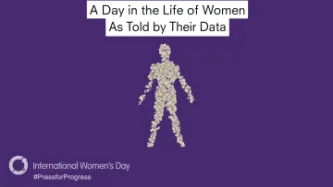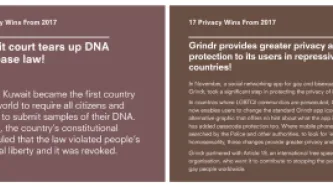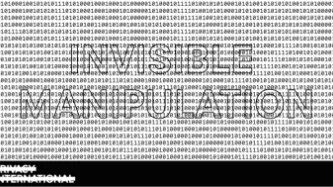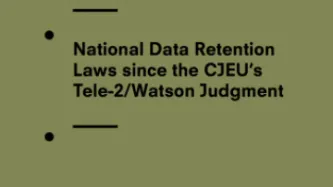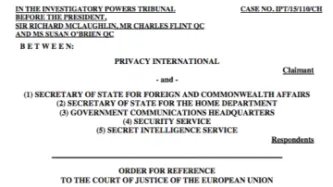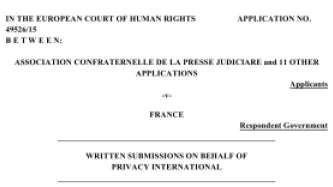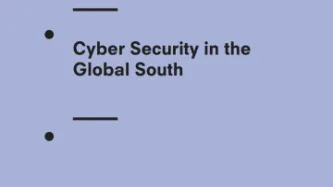Search
Content type: Long Read
Today Privacy International together with 27 other organisations from across Europe urge European governments to strengthen the protection of privacy and security of online communications. The proposal to reform e-privacy in Europe was launched in January 2017. However, despite the clear and urgent need of this reform, recently demonstrated by the Facebook/Cambridge Analytica case, the negotiations by EU member states have been inconclusive. Worse still, some governments seem willing to…
Content type: Long Read
In December 2017, Privacy International published an investigation into the use of data and microtargeting during the 2017 Kenyan elections. Cambridge Analytica was one of the companies that featured as part of our investigation.
Due to the recent reporting on Cambridge Analytica and Facebook, we have seen renewed interest in this issue and our investigation. Recently in March of 2018, Channel 4 News featured a report on micro targeting during the 2017 Kenyan Presidential Elections, and the…
Content type: Long Read
The ongoing Facebook and Cambridge Analytica scandal is a wake-up call for UK policy-makers who too often encourage and promote digital industries over the protection people’s personal data. The scandal has shown that the public is concerned by companies’ exploitation of their data. The current lack of transparency into how companies are using people’s data is unacceptable and needs to be addressed.
Reform should not be limited to the behaviour of individual companies. Consumers are confronted…
Content type: Long Read
Over the past few days we've all learned details about how Cambridge Analytica was able to amass data on voters through the use of an app that would gather data on approximately 50 million Facebook users, including 30 million psychographic profiles.
This is three stories in one.
Yes, this is another story of data that has been exploited for political advantage, again. Political parties and governments continue to want access to social media intelligence and continue to develop profiles…
Content type: Long Read
Image: Eric Jones
The UK government last week hosted hundreds of surveillance companies as it continues to try and identify “technology-based solutions” able to reconcile the need for controls at the Irish border with the need to avoid them.
The annual showcase conference of 'Security and Policing' brings together some of the most advanced security equipment with government agencies from around the world. It is off limits to the public and media.
This year’s event came as EU and UK…
Content type: Long Read
To mark International Women’s Day 2018, Privacy International and some of our partner organisations - Datos Protegidos, Derechos Digitales, the National Coalition for Human Rights Defenders-Kenya, the Karisma Foundation, and the Foundation for Media Alternatives – are telling the stories of women across the world as told by their data over the next seven days (for us, it’s International Women’s Week!).
Gender inequality has many complex dimensions and data exploitation is yet another.…
Content type: Long Read
To celebrate the hard work of privacy advocates around the world, we highlight 17 #PrivacyWins from 2017!
Content type: Long Read
To celebrate International Data Privacy Day (28 January), PI and its International Network have shared a full week of stories and research, exploring how countries are addressing data governance in light of innovations in technology and policy, and implications for the security and privacy of individuals.
Content type: Long Read
“FISA section 702 reauthorisation” might not sound like it matters very much to very many people, but it’s pretty dramatic: in short, last month US lawmakers rejected a bill which would have provided protections for US citizens – constitutionally protected against being spied on by US spy agencies – from being spied on, and instead voted to extend their powers to do so.
In the fall out, it’s worth considering just why such mass surveillance powers are such a big issue, how the promise of…
Content type: Long Read
To celebrate Data Privacy Week, we spent the week discussing privacy and issues related to control, data protection, surveillance, and identity. Join the conversation on Twitter using #dataprivacyweek.
Do you live in a “smart city”? Chances are, you probably do (or at least your city claims to be). But do you know what exactly makes your city “smart”, beyond the marketing term? And what does this have to do with privacy?
Companies and governments will tell you that the more cameras, sensors…
Content type: Long Read
To celebrate International Data Privacy Day (28 January), PI and its International Network have shared a full week of stories and research, exploring how countries are addressing data governance in light of innovations in technology and policy, and implications for the security and privacy of individuals.
According to the World Bank, identity “provides a foundation for other rights and gives a voice to the voiceless”. The UN Deputy Secretary-General has called it a tool for “advancing…
Content type: Report
¿Existen ciudades inteligentes? ¿O son un pretexto para recolectar y procesar más datos? Este informe examina la realidad del mercado de las ciudades inteligentes más allá del uso del término de marketing "inteligente" y las iniciativas existentes. También consideramos las consecuencias y las importantes preocupaciones que surgen en términos de privacidad y otros derechos humanos.
Content type: Long Read
To celebrate International Data Privacy Day (28 January), PI and its International Network have shared a full week of stories and research, exploring how countries are addressing data governance in light of innovations in technology and policy, and implications for the security and privacy of individuals.
At the core of data protection debates, there is a power play between empowering individuals to control their data and empowering those who use (or want to) use their data.
By…
Content type: Long Read
Privacy International is celebrating Data Privacy Week, where we’ll be talking about privacy and issues related to control, data protection, surveillance and identity. Join the conversation on Twitter using #dataprivacyweek.
Exercising the right to privacy extends to the ability of accessing and controlling our data and information, the way it is being handled, by whom, and for what purpose. This right is particularly important when it comes to control of how States perform these activities.…
Content type: Long Read
The era where we were in control of the data on our own computers has been replaced with devices containing sensors we cannot control, storing data we cannot access, in operating systems we cannot monitor, in environments where our rights are rendered meaningless. Soon the default will shift from us interacting directly with our devices to interacting with devices we have no control over and no knowledge that we are generating data. Below we outline 10 ways in which this exploitation and…
Content type: Long Read
The battle for Kenyan voters’ allegiance in the 2017 Presidential election was fought on social media and the blogosphere. Paid advertisements for two mysterious, anonymous sites in particular started to dominate Google searches for dozens of election-related terms in the months leading up to the vote. All linked back to either “The Real Raila”, a virulent attack campaign against presidential hopeful Raila Odinga, or Uhuru for Us, a site showcasing President Uhuru Kenyatta’s accomplishments. As…
Content type: Long Read
Introduction
Why We Are So Concerned about Government Hacking for Surveillance
Scope of Our Safeguards
1. Legality
2. Security and Integrity of Systems
3. Necessity and Proportionality
4. Judicial Authorisation
5. Integrity of information
6. Notification
7. Destruction and Return of Data
8. Oversight and Transparency
9. Extraterritoriality
10. Effective Remedy
Commentary on each
1. Legality
2. Security and Integrity of Systems
3. Necessity and Proportionality
4.…
Content type: Report
When you rent a car at the airport, use a car-share for a family day trip, one of the first things you are likely to do before setting off on your journey, is to connect your phone to the car. You switch on the Bluetooth and see a list of other people’s phones that were previously connected - Mike’s iPhone, Samsung Galaxy, Bikerboy_Troi, Dee Dee. You input your journey into the navigation, perhaps noticing stored locations of previous drivers.
Seems fairly innocuous? Wrong. Your name and…
Content type: Report
Financial services are changing, with technology being a key driver. It is affecting the nature of financial services, from credit and lending through to insurance, and even the future of money itself.
The field of fintech is where the attention and investment is flowing. Within it, new sources of data are being used by existing institutions and new entrants. They are using new forms of data analysis.
These changes are significant to this sector and the lives of people it serves. This…
Content type: Long Read
This piece was originally published in Just Security in November 2017.
The upcoming expiration of Section 702 of the Foreign Intelligence Surveillance Act (FISA) has launched a fresh wave of debate on how the statute’s “backdoor search loophole” allows the U.S. government to access Americans’ communications by searching information gathered on foreign intelligence grounds without a warrant. But while discussion about domestic information sharing is important, a critical…
Content type: Long Read
Photo Credit: AU UN IST / Tobin Jones
El 25 de septiembre 2017, el presidente de Paraguay objetó la totalidad de una propuesta de Ley denominada “que regula la activación del servicio de telefonía móvil”, disponiendo la creación de un registro de huellas dactilares de todos los usuarios de servicios móviles, y la desconexión dentro de un año a todos quienes no se hayan incorporado a este registro, todo ello bajo la excusa de disminuir los robos de identidad en la activación de…
Content type: Report
The smart city market is booming. National and local governments all over the world expect their cities to become more efficient, more sustainable, cleaner and safer by integrating technology, increasing data generation and centralising data to provide better services. From large multinationals to small start-ups, companies want their slice of the multi-billion dollars per year pie of municipal budgets and long-term government contracts.
But do smart cities even exist? And are our cities…
Content type: Long Read
Government hacking is unlike any other form of existing surveillance technique. Hacking is an attempt to understand a system better than it understands itself, and then nudging it to do what the hacker wants. Fundamentally speaking, hacking is therefore about causing technologies to act in a manner the manufacturer, owner or user did not intend or did not foresee.
Governments can wield this power remotely, surreptitiously, across jurisdictions, and at scale. A single hack can affect many…
Content type: Report
This report sheds light on the current state of affairs in data retention regulation across the EU post the Tele-2/Watson judgment. Privacy International has consulted with digital rights NGOs and industry from across the European Union to survey 21 national jurisdictions (Austria, Belgium, Bulgaria, Croatia, Cyprus, Czech Republic, France, Germany, Hungary, Ireland, Italy, Luxembourg, the Netherlands, Poland, Portugal, Romania, Slovakia, Slovenia, Spain, Sweden, and the United Kingdom).…
Content type: Long Read
On 8 September 2017, the Investigatory Powers Tribunal decided to refer questions to the Court of Justice of the European Union (‘CJEU’) concerning the collection of bulk communications data (‘BCD’) by the Security Intelligence Agencies from mobile network operators.
The BCD regime was initially secret. In an earlier judgment, the Investigatory Powers Tribunal ruled that the regime was not compliant with the European Convention on Human Rights prior to its public avowal, but (subject to…
Content type: Long Read
European Court of Human Rights Intervention
On 15 September 2017, Privacy International filed an intervention to the European Court of Human Rights in Association Confraternelle de la Presse Judiciare and 11 Other Applications v. France. This case challenges various surveillance powers authorised under the French Intelligence Act of 24 July 2015 as incompatible with Articles 8 and 10 of the European Convention on Human Rights, which respectively protect the right to privacy…
Content type: Report
In this paper, Privacy International explores* what it means to be secure, and how governments and companies enact policies and laws that undermine security globally. Good cyber security policies and practices put people and their rights at the centre. By prioritising the individual and protecting people, devices and networks, governments could take advantage of a real opportunity - to give something technically complex a human element. In short, giving the tin man a heart.
*This…
Content type: Long Read
Content type: Long Read
This piece was originally published in Just Security in August 2017
We recently published an analysis in Lawfare of the United Kingdom’s surveillance framework as it relates to the proposed U.S.-U.K. agreement for cross-border law enforcement data requests. Implementing the U.S.-U.K. agreement is subject to passage of draft legislation proposed by the Justice Department to Congress in July 2016 (“U.S. DOJ legislation”), which will set standards that approved partners like the U.K.…
Content type: Long Read
This piece was originally published in Lawfare in July 2017.
The United Kingdom has been a key partner in the United States’ efforts to reform the process that law enforcement officials use to make cross-border requests for data. These efforts address both foreign governments’ requests for data stored in the U.S. and reciprocal requests by the U.S. government for data stored abroad. As part of these efforts, the U.S. and the U.K. have negotiated a draft bilateral agreement (“U…





